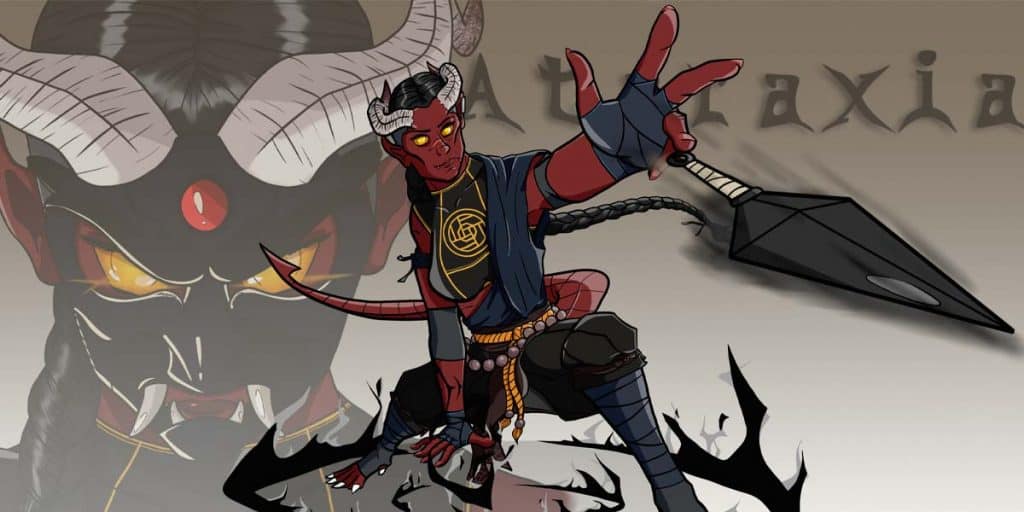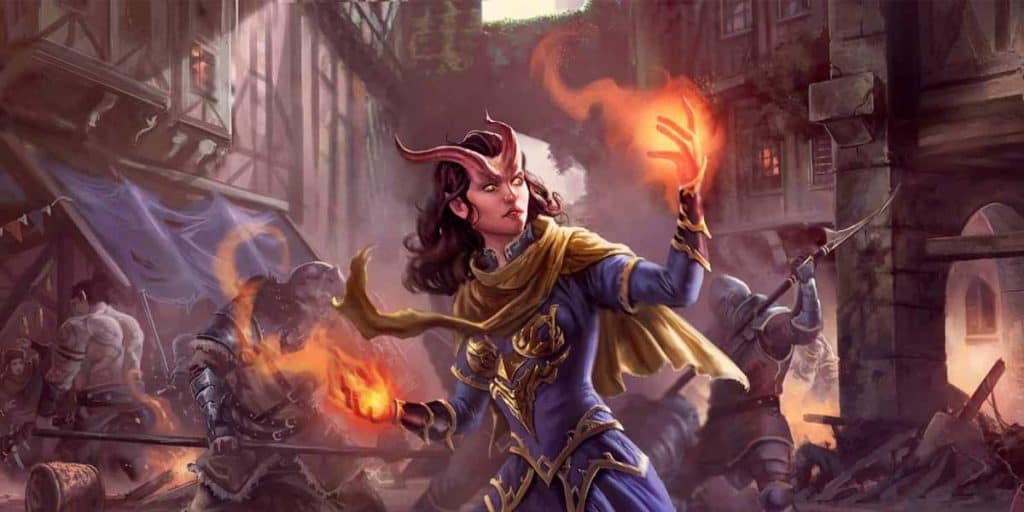Tiefling Bard 5E | D&D Tiefling Bard Guide

When it comes to DnD, there are plenty of characters you can play as. It is safe to say that the characters are the ones that add the maximum flavor to the game. You can either choose an existing character, use a character builder, or can build one manually if you’d like. Plus, there are dozens of other features that you can do with it. DnD allows you to provide a great character background to your character that can make things interesting going forward.
So, you can either give your character a sad, tragic backstory or make them the hero from their early days. Right from a spell casting sorcerer to a magic-fuelled necromancer leading an army of the undead, there are so many options at your disposal. So, this article will be focusing solely on playing a Tiefling Bard.
We have laid down a detailed tiefling bard guide that will walk you through everything to play as a tiefling bard.
What Is A Tiefling?
As we mentioned above, there are dozens of characters to choose from in DnD. One such is a Tiefling. Tieflings are mystical beings and one of the most unique character races available in the game. Plus, these characters have one of the coolest backstories as they have one mortal parent and one parent from the Nine Hells. Literally, how cool is that!!!
Tieflings are technically supposed to be the children of Asmodeus, the prince of hell. However, since the bloodline got busy towards the end, it resulted in an Infernal bloodline popping up in the timeline. While tieflings are great thieves, they also happen to be strong leaders and fiercely loyal creatures.
How To Create A Tiefling Bard?
The bard is one of the most fascinating builds within the game. They have access to every skill, expertise, full casting and come equipped with a decent set of proficiencies. So basically, a bard can fill in every role in a party. Before you create a tiefling bard, you will need to know how a tiefling gets created.
Once you get to know what a tiefling is, it makes it relatively easier to build a tiefling bard. As we mentioned above, Tieflings are children of Asmodeus but are an infernal bloodline which makes them highly discriminated against.
There are three ways in which a tiefling comes into being
- As descendants of a tiefling parent or an ancestor
- A human is transformed into a Tiefling with the help of magic
- When a demon from the Nine realms copulates with a human being
When it comes to creating a bard, you need bards to have their way with music, words, and actions with the help of magic they possess. What makes a bard’s special is that their backstory matters the least as compared to the stories they tell. Those seasoned in the game know that tieflings have a hard time making friends with fellow tieflings or any other character within the game.
Be that as it may, a tiefling remains a valued character in the game and is known for having powerful voices, a battle cry that can be heard for generations. The best place to create a tiefling bard is bard colleges. As the name suggests, a bard college is an institution dedicated solely to creating bards based on the subcategories and subclasses the tiefling specializes in.
Tiefling Bard 5E Character Explained

Bards are highly charismatic beings. Having said that, a bard comes with an added advantage of +2 charisma. As a bard, your key objective will always be to keep your charisma as high as possible. In other words, charisma comes first for a bard, followed by dexterity, constitution, intelligence, and strength. The bard build is marginally similar to a Rogue. Additionally, a bard has dark vision, an advantage in speed, and maximized resistance to fire damage.
Starting Scores
As we mentioned earlier, bards are charismatic characters that use charisma as their primary spellcasting score. This means you should look to invest maximum points into charisma during the starting scores. If you are a Point Buy or Standard Array, you must put at least 15 into Charisma.
If you are rolling your score, this allows you to start with a 20, which happens to be an excellent starting score for bards. Apart from Charisma, Dexterity happens to be the second most important ability score for any bard. In addition to their charismatic ability, bards are handy with a sword. If you are playing as a bard and are looking for added weapon damage, you can choose to pick Dexterity ahead of Charisma.
Once you reach the point limit in Dexterity and Charisma, you can choose to invest the remaining points in Constitution. The more points you have invested in the Constitution, the more are your chances of staying alive. Given that bards don’t get that heavy armor, you need to have some points handy to invest in the Constitution.
Education
Every bard subclass is called a bard college. At a bard college, you can prep your bard to fit in every single bard role there is. Once the bards get their college at Level 3, the college will provide them with several features that will help them in the latter part of the game. The eight Bard colleges are as follows
- Creation
- Eloquence
- Glamour
- Lore
- Spirits
- Swords
- Valor’s, And
- Whispers
Each of these bard colleges specializes in a particular niche. If you are playing as a damage bard, then you can choose from any of these colleges to help add to your dealt damage. However, if you are looking to improve on your melee weapon damage, you will need to do the needful and join either the College of Swords or the College Of Valor.
Both these colleges offer you Blade flourishes that add to your melee damage. Moreover, it aligns your bard’s damage with that of other melee weapon builders. Meanwhile, the College Of Valour allows you to make an extra melee attack post using a spell, thus providing extra damage to all your attacks.
Having said that, the College of Swords is the superior melee class, whereas the Colleges of Valor will train you highly in the defensive side of combat. Now, if you are a bard who knows his way around magic, then the College of Lore is one you need to attend. If you want to be a healer, then the College of Lore grants you spells from the Cleric and the Paladin spell list. This will help you unveil new magical secrets.
Finally, the bards opting for the tank will need to attend either the College Of Valor or the College Of Swords to help bolster their melee damage. Additionally, the College of Valor will grant you extra armor proficiency, followed by shields and martial weapons.
Feats
Feats are an excellent way to further expand your character beyond its original role. Whenever you reach the ability score benchmark, you can use feats to help your character grow beyond their actual role in the game. Those seasoned in DnD know that things and other special items are up to grab throughout the game.
However, these items are class-dependent and wouldn’t be available or accessible to the characters who do not suffice the class requirement. The best way to bypass this ridiculous rule is through feats. Once you reach the ability score benchmark, you can use feats that will grant you access to things present in other classes or things outside your class scope in DnD.
Here are the different feats you can pick up in the game
War Caster
Irrespective of your role, war caster remains the superior feat for all bards. You get a wide combination of spells and melee weapon attacks. As a war caster, you can cast a spell as an attack which helps your concentration when in combat. They are perfect for Valour bards who use their shield proficiency for tanking.
Mobile
If you are playing either a damage dealer or a tank, then the Mobile is a great feat addition. As the name suggests, the feat keeps you mobile, evading and dodging incoming attacks in combat. Additionally, you get an extra 10 feet of movement speed while having the ability to sprint through terrain without any speed penalty whatsoever.
Tough
Just like the War Caster, Tough is another great feat for bards. If you are looking for additional HP, there is no better way of achieving it than with the Tough feat, which gives you an additional +2 HP per level. There are no downsides to this feat. Anyone can pick this up.
Lucky
You can never go wrong with Lucky. It is a great feat to pick up for bards of any role. This is perhaps one of the most potent feats of DnD 5e, allowing you to reroll the dice and use it to get to your desired outcome.
Savage Attacker
As the name suggests, the savage attacker is the perfect feat for dealing additional damage and allows you to impart maximum damage upon every reroll. This is the best feat for bards dealing melee weapon damage.
Resilient
This feat allows a bard to invest an extra point into the constitution and grant extra proficiency on every saving throw. This can further bolster the tanking abilities of a tank bard.
How To Play As A Tiefling Bard?

When playing a bard, the first thing to understand is the role your bard is going to fill. Every class and subclass is designed keeping a particular role in mind. Next up is that you need to thoroughly need to know your bard’s background and story going forward. To play as a tiefling bard, here are the things you need to familiarise yourself with beforehand.
Hit Dice: 1d8 per level
Hit Points (Level 1): +8 Constitution modifier
Hit Points (Level 2 and higher): +5 constitution modifier after 1d8
Spell Save DC: +8 proficiency bonus + your current charisma modifier
Spell Attack Modifier = your current proficiency bonus + your charisma modifier
You can wield magic using your magic and performance when playing as a bard. You have a cheerleading ability that can instantly boost the morale of your fellow teammates or the creature within 60 ft of you. You are the Jack of trades means that you add half of your proficiency bonus to any of the other ability scores. This means you can no longer be bad at anything if you invest enough points in it. Lastly, you can heal yourself with any musical number that comes to your mind.
As a tiefling, you are a natural in a cantrip. Upon reaching level 3, you get a hellish rebuke as a 2nd level spell, whereas you get a darkness spell upon reaching level 5. As we mentioned earlier in the article, tieflings come from an infernal bloodline of beings, making them highly discriminated against. This has made them keep to themselves. Be that as it may, tielfings are quick, self-confident, and tend to have a short temper.
Conclusion
From the article, you may have already gathered the fact that bards are highly versatile characters who fit into any given role quite comfortably. They are the Jack Of All Trades, an ability that allows them to add half their proficiency bonus into any ability score they choose. As always, we hope you enjoyed our article and found it helpful. Please feel free to know if you have questions in the comment box below.






